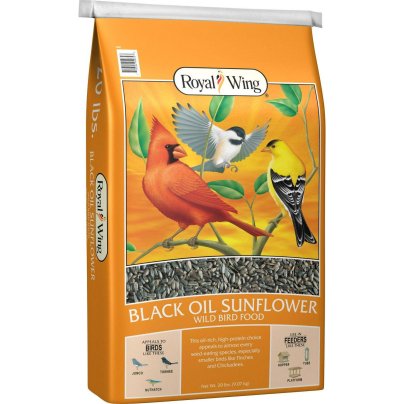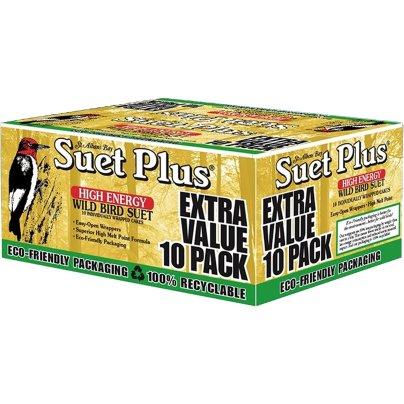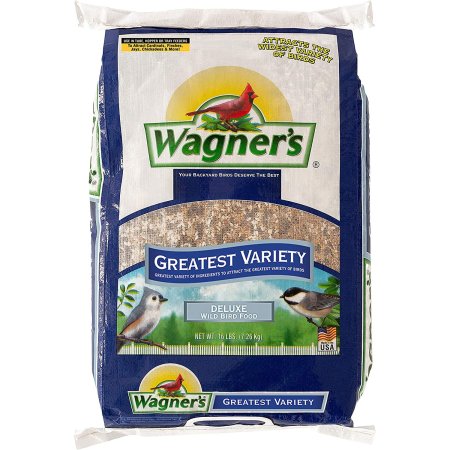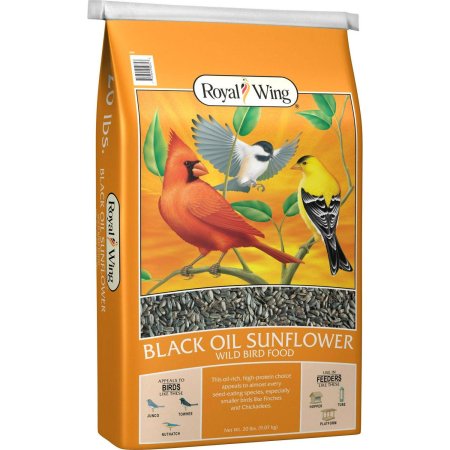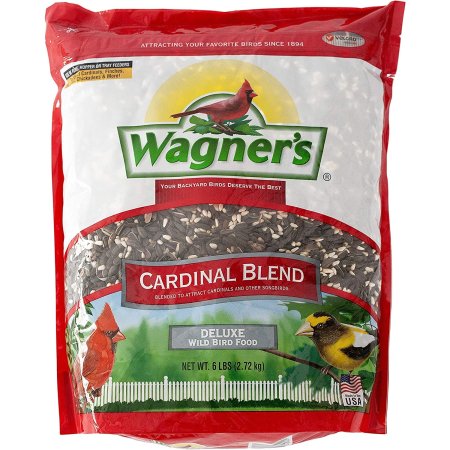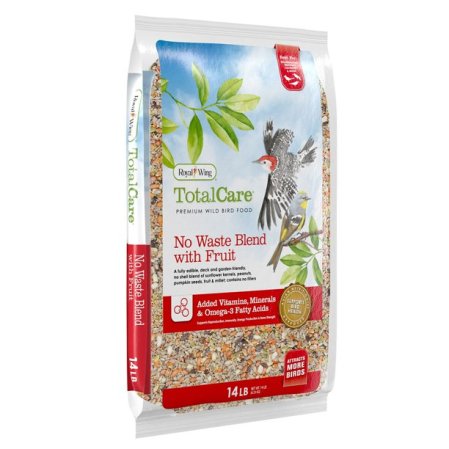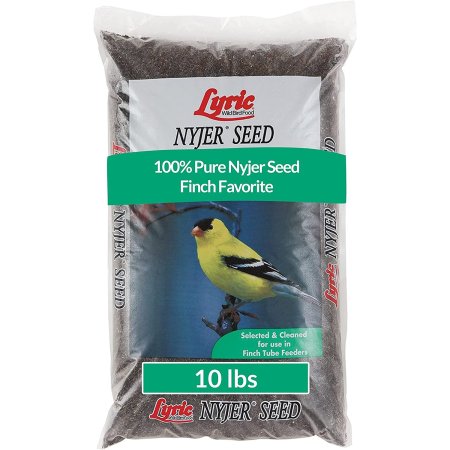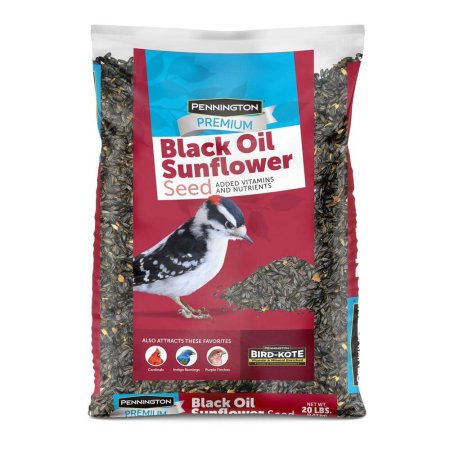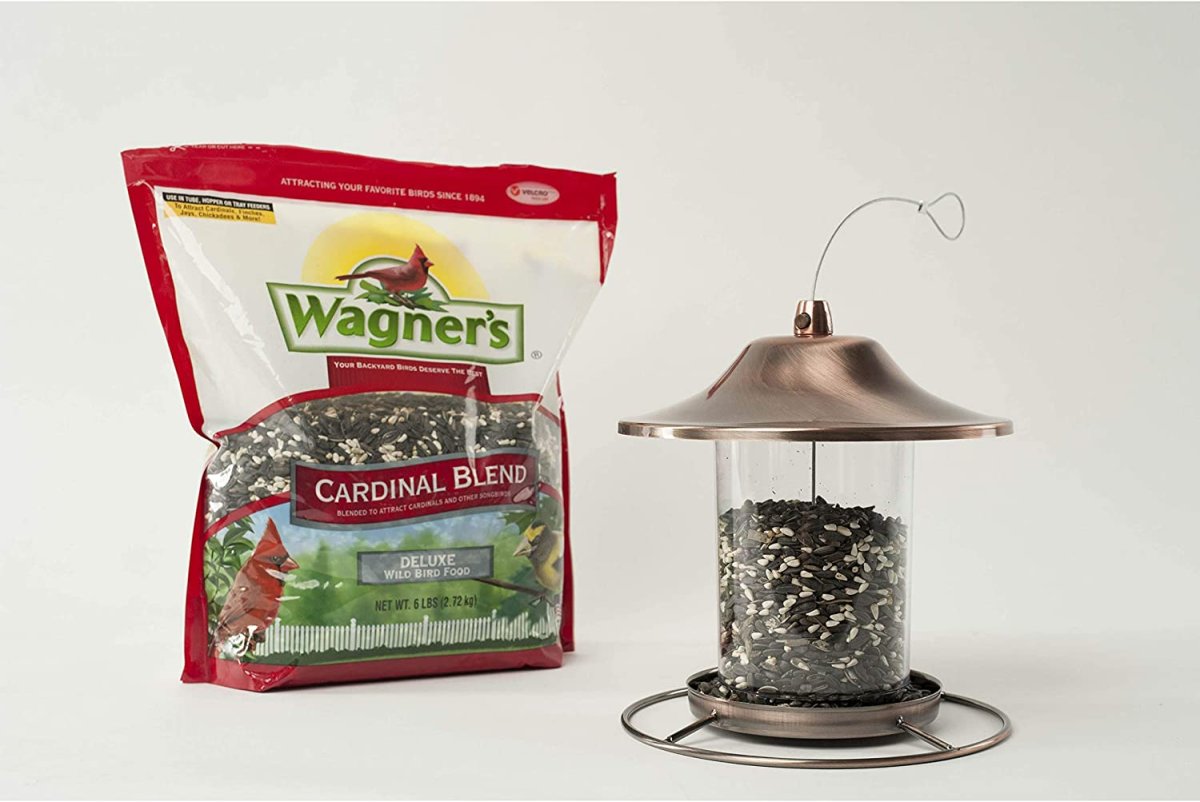
We may earn revenue from the products available on this page and participate in affiliate programs. Learn More ›
Few hobbies are as rewarding as feeding wild birds and watching them become frequent visitors to the backyard. Songbirds are delightful to look at and listen to, and some feast on pesky insects, such as mosquitoes. Those who hope to attract more birds should know that although commercial seed blends are readily available, our feathered friends can be rather picky! Some species may eat one type of seed but not another.
Choosing the right seed involves learning which species of birds are local to the area and then filling the feeder with the type of seeds they can’t resist. Ahead, discover which seed blends will entice a bevy of birds to backyards, and find out why the following products are among the best birdseed choices for feeders.
- BEST OVERALL: Wagner’s Greatest Variety Wild Bird Food Blend
- BEST BANG FOR THE BUCK: Royal Wing Black Oil Sunflower Wild Bird Food
- BEST SUET CAKE: St. Albans Bay Suet Plus High Energy Cakes 10-Pack
- BEST FOR CARDINALS: Wagner’s Cardinal Blend Wild Bird Food, 6-Pound Bag
- BEST SHELLED BLEND: Royal Wing Total Care No Waste Blend with Fruit
- BEST FOR FINCHES: Lyric Nyjer Seed Wild Bird Seed Finch Food
- BEST SUNFLOWER SEEDS: Pennington 20-Pound Premium Black Oil Sunflower Seed

Types of Birdseed
In nature, birds seek out the types of seeds they prefer—watching and waiting for their favorite flowers and grains to go to seed and then swooping in to dine on them. It’s not so much that birds are persnickety; rather, their different bill shapes make it easier for them to eat certain seeds. Plus, some bird feeders accept only specific types of seeds, so it’s important to provide the right type.
Sunflower Seed
The most common seed used in backyard bird feeders, sunflower seeds attract a wide variety of birds. The seeds are high in protein and fat content, which helps sustain birds throughout cold winters. Black oil sunflower seeds attract finches, nuthatches, cardinals, and many other species. Unfortunately, it’s also a favorite of blackbirds and starlings—species that can overwhelm a feeder and edge out songbirds. Squirrels are also known for raiding feeders filled with sunflower seeds.
Nyjer Seed
Also known as thistle seed, nyjer is a tiny black seed used to attract canaries, goldfinches, and purple finches. Feeding nyjer seeds requires a tube-type feeder with very small holes because the tiny seeds will spill out of the larger holes found on many types of feeders. Likewise, tray-type feeders are unsuitable because the seeds are so lightweight, a gentle breeze can blow them away.
Millet
Millet is a relatively inexpensive grain used in many blends—and in human breakfast cereals. Many backyard birds, including goldfinches, indigo buntings, and cardinals, enjoy millet. When looking for an affordable birdseed blend, it’s better if it contains millet as a filler rather than corn or milo, which are better suited for game birds rather than songbirds.
Safflower Seed
This moderately affordable birdseed is high in fat, so it plays a vital role in an overwintering bird’s diet; plus, it’s favored by the northern cardinal, a popular favorite. Those who’ve tried attracting songbirds only to have their bird feeders raided by squirrels may want to try feeding safflower seeds, since squirrels don’t seem to like them.
Corn
Eastern bluebirds love whole corn kernels, but these large seeds are more likely to attract game birds, such as pheasants and quail. Corn can be fed on a tray-type or a platform feeder, although it’s usually spread on the ground. In addition to attracting game birds, corn also attracts a variety of four-legged wildlife, including deer and raccoons. When corn is used as a filler in birdseed blends, it’s crushed (which is referred to as “cracked corn”) before being added to the mix—the smaller pieces make it easier for small birds to eat.
Milo
Used chiefly as a filler in inexpensive seed blends, milo, like cracked corn, doesn’t attract a wide variety of songbirds, but it will attract blackbirds, crows, and starlings, which may run other birds away from the feeder. When looking for the best bird-feed blends, it’s usually better to avoid mixes that contain high percentages of milo.
What to Consider When Choosing the Best Birdseed
The first step in choosing the right birdseed is for shoppers to consider the types of songbirds they want to attract. Unless they plan on feeding a select bird species, such as goldfinch, for which they’d want to purchase straight nyjer seed, they’ll probably want a mix of seeds that attracts a range of birds.
Mix Proportions
In many seed blends, a well-liked but inexpensive large seed is often the basis of the mix. Seeds such as black oil sunflower or safflower may account for up to 75 percent or so of the mix. Smaller seeds, such as nyjer, or millet may make up the balance of the mix. For the best result, avoid mixes with milo or wheat as the prominent ingredient because many birds will simply discard these seeds on the ground. After all, the best food for birds is the food they will eat!
Freshness
Fresh birdseed is always the best option for backyard feeders. Storing seed in a humid garage or where rodents can get into it can reduce the quality and even lead to mold growth. To ensure birds get the freshest seed, purchase in quantities no larger than you will use in about 6 months. Store the seed in a container with an airtight lid to prolong freshness.
Other Ingredients
In addition to seeds and grains, the best wild birdseed mix blends often include ingredients such as chopped nuts (almonds, peanuts, walnuts, and more). Dried fruits, such as raisins and cherries, may also be included. Nuts and fruits are often found in premium blends because these ingredients are more expensive, but they attract a wide range of birds, including blue jays and woodpeckers.
Another ingredient may be suet, a blend of fats and nut butter. It’s used to bind seeds together in a small square or cylindrical shape for slipping into a suet feeder. For those interested in making their own suet, Audubon offers a recipe.
Our Top Picks
Whether you’re trying to attract a specific songbird species to the backyard or are interested in supplementing food for all overwintering birds, the following list offers some of the best birdseed options. We’ve selected high-quality seeds and seed blends in a variety of types and budget ranges, so odds are, there’s something here to suit everyone’s bird-feeding needs.
Best Overall
Wagner’s Greatest Variety Wild Bird Food Blend
Pros
- Extensive variety of seeds to attract many bird species
- Good selection for overwintering birds
- High percentage of black oil sunflower seeds
Cons
- May attract blackbirds, crows, and squirrels
Product Specs
- Product weight: 16 pounds
- Ingredients: Sunflower seeds, safflower seeds, millet, sunflower chips, nyjer seed, peanut chips, canary seed, cracked corn, tree nuts, raisins
- Feeder type: Large-hole tube feeder; tray feeder
For those looking to feed a variety of bird species or figure out which species are prominent in their area, it’s hard to beat Wagner’s Greatest Variety Wild Bird Food Blend. It comes in a 16-pound bag, and the main ingredient is black oil sunflower seed, which attracts many birds, including cardinals, doves, and woodpeckers.
It also contains a healthy mix of safflower seed, millet, nyjer seed, peanuts, tree nuts, raisins, and other beneficial seed types. This inclusive blend provides many of the essential nutrients birds need to stay healthy, such as protein, fat, and fiber. Because the blend contains large seeds, use a large-hole tube or tray feeder, which will give the birds easy access. Avoid using this blend in a small-hole tube feeder, where it will likely cause clogs.
Get the Wagner’s variety blend birdseed on Amazon or Chewy.
Best Bang for your Buck
Royal Wing Black Oil Sunflower Wild Bird Food
Pros
- Affordable price per pound
- Attracts many bird species
- Offers essential protein and fat
Cons
- May attract unwanted bird species or squirrels
Product Specs
- Product weight: 20 pounds
- Ingredients: Black oil sunflower seeds
- Feeder type: Large-hole tube feeder; tray feeder
The cost of expensive birdseed blends shouldn’t keep users from feeding and enjoying their colorful feathered friends all year long. This 20-pound bag of black oil sunflower seeds is a bargain considering the cost per pound. Plus, it’s an even better bargain as it contains no cheap fillers or additives that birds may not eat. Sunflower seeds are rich in protein and fats, making this product a winner for overwintering birds or supplementing the diets of seasonal songbirds.
Black oil sunflower seeds attract many bird species, including cardinals, blue jays, house finches, sparrows, painted bunting, robins, and bluebirds. The large size of the seeds is best suited to a large-hole tube feeder or a tray feeder.
Get the Royal Wing black oil sunflower birdseed at Tractor Supply Co.
Best Suet Cake
St. Albans Bay Suet Plus High Energy Cakes 10-Pack
Pros
- High protein
- Easy to use
- No-mess packaging
Cons
- Could soften and melt if located in a sunny spot
Product Specs
- Product weight: 11 ounces per cake (sold as a 10-pack)
- Ingredients: Rendered beef suet, sunflower seeds, various grains
- Feeder type: Suet cage
Those who prefer the ease of feeding wild birds with suet cakes rather than loose seed should consider St. Albans Bay suet cakes. They contain cracked corn, black oil sunflower seeds, and various grains—all held together in cakes with beef suet that’s been rendered (i.e., cooked down) to remove impurities.
When placed in a traditional cage-type suet feeder, the essential fats and protein in these suet cakes will attract species that perch or cling to the sides of trees and other objects. This includes blue jays, juncos, cardinals, chickadees, woodpeckers, and more. Feeding with St. Albans Bay suet cakes requires using a wire suet cage (sold separately).
Get the St. Albans Bay birdseed at Amazon, Farm and Home Supply, or L&M Fleet Supply.
Best for Cardinals
Wagner’s Cardinal Blend Wild Bird Food, 6-Pound Bag
Pros
- Seeds cardinals love
- Provides essential fat and protein
- No filler
Cons
- Other birds and squirrels could be attracted to the feeder
Product Specs
- Product weight: 6 pounds
- Ingredients: Black oil sunflower seeds, striped sunflower seeds, safflower seeds
- Feeder type: Large-hole tube or platform
Cardinals love sunflower seeds, and Wagner’s Cardinal Blend includes two types, black oil and striped, which is a variety that’s nutritious and delicious for many birds. The blend also contains safflower seeds but no fillers such as milo or wheat, which many birds won’t eat, so there’s less chance of waste and mess.
This cardinal-specific blend provides the protein, fat, and fiber cardinals need to thrive through the cold winter months. Pair this large-seed mix with a large-hole tube feeder or a platform feeder for the best results.
Get the Wagner’s cardinal blend birdseed on Amazon or Chewy.
Best Shelled Blend
Royal Wing Total Care No Waste Blend with Fruit
Pros
- Seeds are shelled to reduce waste
- Fruit-and-nut blend
- Ground stays cleaner
- Attracts many types of birds
Cons
- Pricey
- May also attract unwanted bird types
- Must be stored in an airtight container to prevent spoilage
Product Specs
- Product weight: 25 pounds
- Ingredients: Sunflower, peanuts, raisins, papaya, millet, vitamin supplements, natural preservatives
- Feeder type: Mid- to large-hole tube feeder; platform feeder
Birds are beautiful, but the mess they make beneath a feeder with sunflower and safflower seed shells can be an eyesore. That’s where Royal Wing’s Total Care birdseed blend comes in. The hulls are already removed, so there’s nothing for the birds to discard on the ground.
Total Care contains a mix of sunflower seeds, pumpkin seeds, nuts, and fruit—and just as importantly, it’s free of fillers, such as wheat and milo, so that every little morsel will be a tasty treat. It provides protein, essential fats, and the fiber birds need. It’s a bit on the pricey side, but it’s all nutrition and no mess.
Get the Royal Wing Total Care birdseed at Tractor Supply Co. or on Warehouse76.
Best for Finches
Lyric Nyjer Seed Wild Bird Seed Finch Food
Pros
- Thistle seeds finches love
- Seeds have been cleaned
- Attracts all types of finches, plus pine siskins
Cons
- Not suitable for tray-type feeders
Product Specs
- Product weight: 10 pounds
- Ingredients: 100 percent nyjer seeds
- Feeder type: Small-hole tube feeder
Fans of brightly colored finches are advised to offer one of their favorite foods: nyjer seeds. Lyric’s Nyjer Seed is composed of 100 percent tiny nyjer (thistle) seeds, prized by gold finches, purple finches, rose finches, and pine siskins. Nyjer seed provides the protein, fats, and fiber essential to a finch’s diet.
The seeds are so lightweight and small, they should only be used in a small-hole tube feeder—they tend to blow out of tray-type feeders. Using this type of feeder will also discourage larger, unwanted bird species.
Get the Lyric birdseed at Amazon, Ace Hardware, or Chewy.
Best Sunflower Seeds
Pennington 20-Pound Premium Black Oil Sunflower Seed
Pros
- Attracts a variety of wild birds
- Enriched with nutrients
- No fillers
Cons
- May attract unwanted birds and squirrels
- Shells may accumulate below the feeder
Product Specs
- Product size: 20 pounds
- Ingredients: Black oil sunflower seeds, Bird-Kote
- Feeder type: Large-hole tube feeder; tray feeder
This variety from Pennington features the most popular type of birdseed around—black oil sunflower seeds, which are known to attract a wide variety of birds. The product also includes Bird-Kote, Pennington’s proprietary blend of vitamins and minerals designed to give birds extra nutrients.
With these black oil sunflower seeds, feeders can expect to attract a range of birds, including bright-red cardinals, indigo buntings, woodpeckers, and more. Sunflower seeds provide essential protein, fat, and fiber, making them a good choice for overwintering birds or year-round feeding. Due to seed size, a large-hole tube or tray-type feeder is recommended.
Get the Pennington black oil sunflower birdseed at The Home Depot.
Our Verdict
All the birdseed products in this lineup contain high-quality ingredients that attract birds, but we chose Wagner’s variety blend birdseed as our Best Overall pick because it has the largest variety of seeds for attracting the most comprehensive range of wild-bird species. Our budget pick, Royal Wing black oil sunflower birdseed, allows bird lovers to feed their feathered favorites without spending a lot of money.
How We Chose the Best Birdseed
We selected this list of the best birdseed after researching the types of seeds that attract different birds and provide essential nutrients. We looked into more than 25 popular birdseed products to find the ones we felt our readers would have the best luck using in their own feeders.
Our final list contains a variety of types, since not all birds are attracted to all seeds and because different bird species live in different regions of the country. We considered brand reputation to an extent—Royal Wing and Pennington are well known and respected as manufacturers of quality birdseed. Still, we didn’t automatically eliminate products from smaller or niche brands if they contained carefully selected seeds and consumers rated them highly.
We also listed a few highly rated birdseed blends that include dried fruits and nuts because these ingredients attract additional songbirds, making them among the best wild bird food choices.
FAQs
Feeding birds in the backyard is a favorite hobby of many, but it requires knowing which types of birds are in your area and what their favorite seeds are. Those who are new to the hobby will likely have some questions, which we address below.
Q. What types of seeds are in birdseed?
Birdseed blends can include a variety of seeds, nuts, or fruits. The most common seeds are sunflower and safflower, but millet (a grain) and nyjer are also popular choices.
Q. Which is the best birdseed?
That will depend on the birds you’re trying to attract. For example, goldfinches love nyjer seeds but won’t eat cracked corn. To attract the widest range of wild birds, choose a blend that incorporates black oil sunflower seeds, a favorite of many species.
Q. What seed is best for small birds?
Both nyjer and millet are popular options for small birds.
Q. What time of day do birds feed?
Birds typically start hunting for food at dawn and continue all day long, although mornings and early evenings are often the busiest times at a home feeder.
Q. Is birdseed actually good for birds?
Yes, and in some cases, such as during the dead of winter, it may be their primary food source. Just be sure to choose a birdseed blend carefully. Avoid those with high percentages of milo or wheat, which many birds won’t eat.
Q. Which birdseed is the least messy?
No birdseed is entirely mess-free, but among the least messy are shelled blends with the outer casings removed. This allows the bird to eat all of the product rather than discard the shells, which can end up making a mess.

